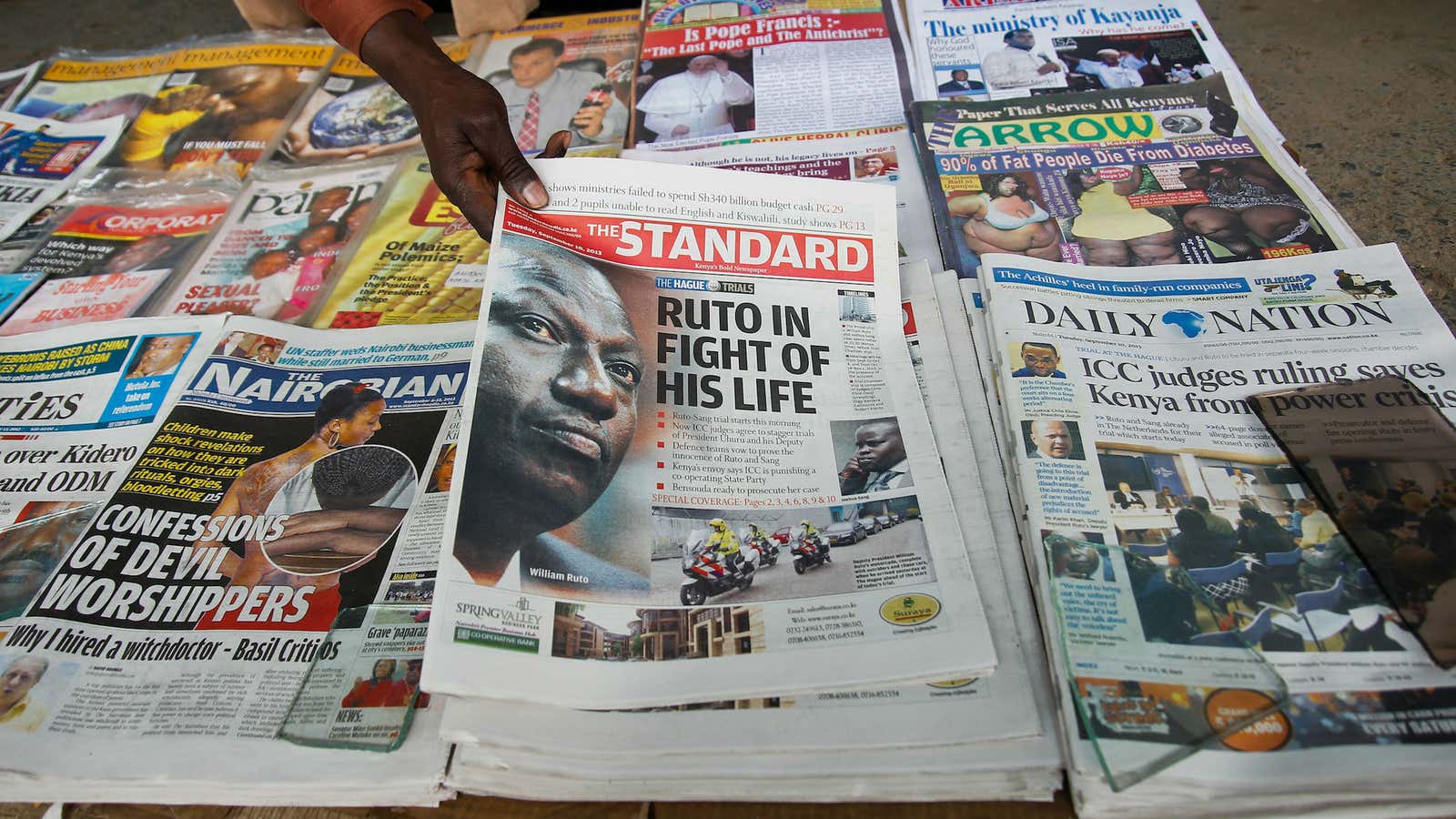When Denis Galava was asked to write an end-of-year editorial for his newspaper, the Daily Nation, Kenya’s most sold daily, the journalist spent six hours at the library reading news clippings for every month of 2015— reports of a faltering economy, terrorist attacks, and worker strikes. “It was a year of pain,” he tells Quartz.
Within half an hour he penned his editorial, ”Mr. President, get your act together this year,” calling on president Uhuru Kenyatta to finally start paying attention to the people of Kenya. It was published on Jan. 1st. Within five days he was suspended from his job as head of investigations and special projects at the paper, and on Jan. 20th he was fired, effective immediately.
Galava’s dismissal is the latest example of what media observers worry is the weakening of one of the most active and independent media corps in Africa. The news has set off a firestorm of criticism against the newspaper known for standing up to former president Daniel Moi, a repressive leader who ruled Kenya as a “single party democracy” for 24 years.
The newspaper is conducting a review of Galava’s firing, according to an outside media consultant that has been asked to help. (Tom Mshindi, editor in chief of the Nation Media Group, which owns the Daily Nation, says that no external review has been called for.)
The 41-year-old journalist is filing a lawsuit against his former employer for wrongful termination. “I believe the editor-in-chief abdicated his professional duties and chose to suspend and sack me to please the powers that be politically and financially,” Galava says.
The paper dismisses accusations that its managers are cowing to political pressure. “Denis was let go because he did not follow procedure and process in filing an editorial. As a senior editor, it is shocking that he claims he was unaware of what is expected in writing editorials, which represent the position of the newspaper,” Mshindi wrote in an email to Quartz. The editorial is still on the paper’s website.
Kenya is one of few countries on the continent that has a long tradition of private media. Nation Media Group was founded in 1959 and is now the largest private media house in east and central Africa. For years, Kenyan media has been seen as a trusted institution and the Daily Nation was at the forefront of pushing for multiparty democratic elections in the 1990s.
Now that has been complicated by politics and financing. There are estimates that as much as 40% to 50% of Kenyan media outlets’ revenue comes from government advertising—public announcements, police recruitment, government tenders. Mshindi says between 10% and 15% of the paper’s revenues, on average, come from government advertising. The paper’s support of the opposition party who eventually came to power in 2002 has made the paper seem pro-government in the years since then.
“Now it has reinforced those perceptions with action that will be widely interpreted, even if wrongly, as punishing an editor for espousing a view that angered State House. The damage will be almost impossible to undo,” Macharia Gaitho, a former managing editor at the paper told local media.
Lawmakers have passed bills that would penalize journalists with up to three years in prison and fines of as much as 5 million Kenyan shillings (about $50,000) for any information that could undermine counterterrorism efforts. Defamation is considered a criminal offense. Harassment is on the rise, according to media advocates. There were at least 19 cases of assault on Kenyan journalists in 2014, according to the nonprofit Freedom House, including one journalist who was bludgeoned to death as he was leaving his paper’s office in the western city of Eldoret. Kenya is ranked 100th out of 180 countries in press freedom, according to Reporters Without Borders, down from 75th place in 2002.
Galava’s misstep may not have been panning the government but criticizing Kenyatta directly. Galava says he has penned dozens of editorials critical of the government and earlier this month, Kenya’s chief justice Willy Mutunga wrote a widely circulated piece calling Kenya a “bandit economy” run by cartels collaborating with politicians, the military, and business leaders.
In Galava’s editorial, he calls out the president who has been in office since 2013 for failing to live up to campaign pledges:
“Your Excellency, three years is a long time to live on hope. On more than one occasion you have addressed the nation and promised to fix the fundamentals of statehood once and for all. However, nothing has come of it. Your Excellency, why do you make promises that you cannot keep?… Happy New Year, Your Excellency.”
By going after the president directly Galava knew he was going a step further, but he didn’t anticipate quite this much backlash. “I thought I was recording the obvious,” he says.
